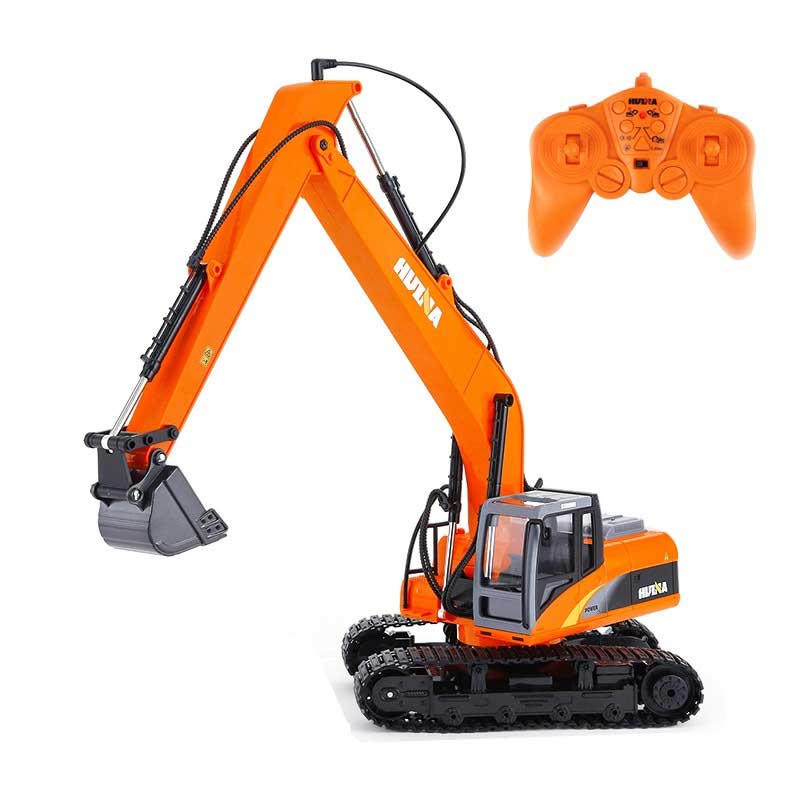Recognizing Just How Excavator Functions and Its Effect On Efficiency
Excavators play an important function in construction and mining operations, relying on an intricate interplay of mechanical and hydraulic systems. Their capacity to perform a variety of jobs rests on both their design and the modern technology incorporated within. Recognizing these parts can significantly impact operational performance and performance. As developments proceed to reshape the sector, one have to take into consideration exactly how these changes will affect future techniques and performance.
The Basics of Excavator Mechanics

The Duty of Hydraulic Solutions in Excavators
At the heart of excavator operation lies the hydraulic system, which plays a crucial function in powering the maker's activities and features. This system uses pressurized hydraulic fluid to transfer energy, making it possible for numerous activities such as lifting, digging, and swinging. By utilizing the principles of hydraulics, excavators can carry out tasks with exceptional accuracy and force, improving overall operational efficiency.The hydraulic system includes vital components, including cyndrical tubes, pumps, and shutoffs, which interact to control the flow and direction of the liquid. When the driver engages the controls, the hydraulic fluid is guided to specific cylinders, equating the driver's commands right into physical movement. This system permits smooth and responsive actions, which are crucial in building and excavation settings. double e volvo rc excavator. The performance of the hydraulic system straight affects the performance and adaptability of the excavator, making it a vital element in modern-day excavation processes
Secret Parts of an Excavator
Recognizing the crucial elements of an excavator is vital for understanding exactly how this powerful device runs. An excavator contains numerous considerable components, including the undercarriage, house, pail, boom, and arm. The undercarriage supplies security and wheelchair, usually including tracks or wheels to navigate numerous surfaces. Your home contains the engine and hydraulic systems, allowing the driver to regulate movement and power the device. The boom prolongs from your home, enabling vertical reach, while the arm attaches to the bucket, helping with digging and lifting operations.Additionally, the cab houses the operator, equipped with controls for specific maneuvering. Each of these parts plays an important role in the excavator's overall functionality, adding to its performance and efficiency on building and construction sites. Recognizing these components assists in preserving and enhancing excavator efficiency, making certain jobs are finished securely and effectively.
Attachment Convenience and Its Benefits
Accessory convenience is a vital element of excavators, making it possible for drivers to switch between different devices customized for particular tasks. This adaptability not just improves work effectiveness but also adds to cost-effectiveness by reducing the need for numerous machines. Understanding the different types of attachments readily available can greatly affect the overall efficiency and capability of an excavator on work websites.
Kinds of Accessories
While excavators are largely identified for their excavating capabilities, their true convenience hinges on the broad range of accessories offered. These accessories improve the excavator's functionality, allowing it to perform numerous tasks past excavation. Typical attachments consist of buckets (for digging and scooping), hydraulic thumbs (for grasping materials), and augers (for piercing holes) Grapples are made use of for moving and taking care of debris, while rippers can damage up difficult surfaces. Various other specialized attachments, such as plates and plows, allow excavators to adjust to specific task demands. This diversity not just boosts the machine's energy across various sectors, consisting of landscaping, demolition, and building and construction, yet likewise permits drivers to tailor their devices to fulfill certain project needs efficiently.
Boosted Task Efficiency
Taking full advantage of task effectiveness is a primary benefit of utilizing various excavator accessories. Different add-ons permit an excavator to carry out multiple jobs without needing to switch over equipment, conserving important time and labor. For circumstances, using a hydraulic hammer can break concrete while a pail attachment can dig deep into dirt, making it possible for a smooth workflow. This adaptability lowers downtime connected with equipment changes and enhances productivity on-site. Furthermore, specialized add-ons improve accuracy in tasks such as grading or landscape design, leading to better end results. The ability to adapt to numerous task demands not just streamlines operations but additionally minimizes the demand for additional machinery, guaranteeing that projects are finished quickly and properly. Overall, attachment flexibility considerably adds to enhanced job effectiveness in excavation work.
Cost-Effectiveness and Versatility
Cost-effectiveness is a significant advantage of making use of flexible excavator add-ons. These attachments allow a solitary excavator to execute several jobs, decreasing the demand for additional machinery and labor - double e volvo rc excavator. By switching in between buckets, hammers, and grapples, operators can tackle different tasks, from digging to demolition, thereby optimizing devices use. This flexibility not just reduces operational costs yet additionally reduces downtime related to transforming tools. Furthermore, the capacity to tailor excavators with specialized add-ons improves productivity, as they can efficiently deal with diverse tasks according to project needs. In conclusion, the combination of cost-effectiveness and versatility in excavator attachments adds to improved operational efficiency and source allocation in building and construction and excavation jobs

Advanced Modern Technology in Modern Excavators
Modern excavators are increasingly outfitted with advanced technology that changes excavation processes. Automation streamlines procedures, while improved fuel efficiency lowers operational costs. Additionally, clever control systems boost precision and safety and security, noting a significant advancement in excavation devices.
Automation in Excavation Processes
As excavation modern technology progresses, automation has become an important part in improving performance and precision on work websites. Modern excavators are furnished with advanced automated systems that assist in jobs such as grading, digging, and trenching with marginal driver intervention. These systems use sensing units, GPS, and artificial intelligence algorithms to guarantee exact placing and deepness control, significantly minimizing the margin for mistake. Additionally, automation permits drivers to concentrate on critical decision-making instead than hands-on controls, resulting in enhanced productivity overall. Such advancements not just improve operations yet also enhance safety by minimizing human error in intricate operations. The integration of automation in excavation procedures represents a significant improvement in construction technology, driving the market towards better effectiveness and effectiveness.
Boosted Fuel Performance
Innovations in his response modern technology have actually also brought about considerable improvements in gas efficiency for modern excavators. Modern equipments are outfitted with innovative engines that maximize power output while lowering fuel intake. These engines use cutting-edge burning technologies, such as turbocharging and straight gas shot, to enhance performance and effectiveness. In addition, light-weight products in construction reduce overall weight, enabling for less energy expense during procedure. The intro of variable rate controls makes it home possible for operators to adjust engine performance according to certain tasks, additionally lessening fuel use. Therefore, these improvements not only lower operational expenses however likewise add to ecological sustainability by lowering discharges. On the whole, enhanced fuel performance in excavators is a crucial growth that bolsters performance and economic practicality in the construction market.
Smart Control Equipment
While drivers navigate progressively complex work sites, clever control systems in excavators have arised as important devices for enhancing effectiveness and precision. These innovative technologies use formulas and sensors to keep track of different specifications such as lots weight, terrain problems, and functional performance. By immediately readjusting hydraulic functions, clever systems maximize maker performance, causing boosted performance and reduced wear on parts. Furthermore, operators gain from intuitive user interfaces that provide real-time responses and diagnostics, permitting informed decision-making. This assimilation of innovation not just simplifies operations however also lessens human error, adding to more secure job environments. As the building and construction market remains to develop, clever control systems will certainly play an essential role in forming the future of excavator efficiency and efficiency.
Enhancing Functional Efficiency With Excavators
Excavators play an essential function in boosting operational performance throughout numerous building and excavation tasks. Their adaptability enables for multiple tasks, consisting of digging, material, and training handling, which enhances workflows and reduces the demand for extra tools. With powerful hydraulic systems, excavators can perform heavy-duty tasks with accuracy, substantially lowering the time needed to full jobs. The combination of sophisticated innovation, such as general practitioner and automated controls, better optimizes their procedure, making it possible for operators to accomplish higher precision and decrease material waste. In addition, contemporary excavators are developed to eat less fuel and reduce discharges, contributing to both cost financial savings and environmental sustainability. By utilizing excavators properly, construction teams can improve efficiency, satisfy task deadlines, and boost general website administration. This multifunctionality and efficiency make excavators indispensable devices in the modern building and construction landscape.
The Future of Excavators in Building and Mining Industries
As the building and construction and mining markets develop, the future of excavators is positioned for considerable transformation driven by technological technology and changing functional demands. Advancements in automation and synthetic knowledge are reshaping excavator abilities, permitting enhanced accuracy and efficiency in operations. Independent excavators are arising, reducing the requirement for human treatment and reducing the risk of accidents.Moreover, the combination of telematics and IoT modern technology enables real-time tracking of equipment efficiency and anticipating maintenance, maximizing uptime. Green designs, including hybrid and electrical models, are acquiring grip, lining up with sustainability objectives within the industry.Additionally, the usage of sophisticated products and lighter designs boosts gas efficiency while maintaining efficiency criteria. As these patterns progression, excavators will play a vital function in satisfying the raising needs for performance and safety and security in building and mining, eventually changing functional landscapes.
Regularly Asked Inquiries
How Do Climate Condition Influence Excavator Efficiency?

Weather considerably influence excavator efficiency, as rainfall and mud can hinder traction and stability, while severe temperatures may affect hydraulic systems. Operators must adjust to these variables to guarantee excellent capability and security during procedures.
What Safety And Security Steps Should Operators Comply With While Making Use Of Excavators?
Precaution for excavator drivers consist of wearing proper individual safety equipment, carrying out pre-operation examinations, making certain appropriate communication with ground employees, preserving a secure distance from above risks, and adhering to well established operational protocols to protect against mishaps.
Just How Typically Should Excavators Be Preserved for Optimum Performance?
Excavators ought to be kept frequently to assure peak performance, usually every 250 operating hours or as defined by the manufacturer. Routine checks enhance dependability, protect against unanticipated break downs, and expand the lifespan of the equipment.
What Is the Typical Life-span of an Excavator?
The ordinary lifespan of an excavator usually varies from 10,000 to visit this website 15,000 hours of procedure. Variables influencing longevity include maintenance methods, operating problems, and the quality of the device itself, impacting total performance and performance.

Can Excavators Operate Unequal Surface Effectively?
Excavators can operate efficiently on unequal surface as a result of their articulated designs and adjustable tracks. These features permit them to maintain stability and grip, making it possible for efficient operation in tough environments commonly encountered in construction and landscape design jobs. Each of these parts plays an essential role in the excavator's general performance, contributing to its performance and efficiency on building and construction sites. Making the most of job performance is a main advantage of using numerous excavator attachments. While drivers navigate significantly intricate work sites, wise control systems in excavators have actually emerged as necessary tools for enhancing performance and precision. Excavators play a vital duty in enhancing operational performance across numerous construction and excavation tasks. Breakthroughs in automation and artificial knowledge are reshaping excavator abilities, enabling for enhanced accuracy and effectiveness in operations.